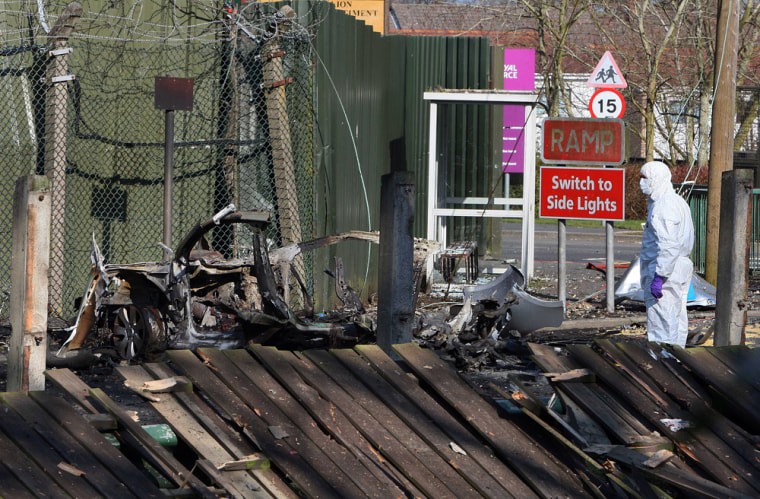Irish Republican Army dissidents detonated a bomb Monday outside the British spy headquarters in Northern Ireland, police said, just hours before rival Catholic and Protestant leaders were to elect a new justice minister in a long-sought step in peacemaking.
The Police Service of Northern Ireland said IRA dissidents held a Belfast taxi driver at gunpoint in his home and used his cab to carry the bomb to the security walls of Palace Barracks, a former British Army base that houses the Northern Ireland branch office of domestic spy agency MI5.
Police said the blast at 12:24 a.m. (2324 GMT) caused no serious injuries and little damage to nearby homes in Holywood, a Belfast suburb.
Local politicians said about 50 local residents had been evacuated to a community hall after authorities received telephone warnings of the bomb. A Protestant politician, Basil McCrea, said one man was hospitalized suffering from suspected shock after he "was blown off his feet" by the blast's shockwave.
Timed attack
Politicians agreed the attack appeared timed to undermine Britain's transfer of government powers Monday to a new Justice Department in Northern Ireland's unwieldy coalition of British Protestants and Irish Catholics.
British powers for running the justice system were transferred officially at midnight just 24 minutes before the bomb detonated. However, Britain is retaining control over key law-enforcement powers, in particular by giving MI5 agents the lead role in gathering anti-terrorist intelligence in Northern Ireland.
Later on Monday, Northern Ireland lawmakers are scheduled to appoint Alliance Party leader David Ford as the new justice minister of their nearly 3-year-old coalition. Such cross-community cooperation was the cornerstone of the U.S.-brokered Good Friday peace accord of 1998.
Ford's party, unusually for Northern Ireland, seeks support equally from both the Protestant majority and Catholic minority. Until now Alliance has been excluded from power-sharing posts because of its weak electoral support.
But the two hard-line opposites leading the coalition — the Protestants of the Democratic Unionists and the Catholics of the IRA-linked Sinn Fein — have backed Ford as a compromise candidate because neither party wants the other side to control the politically sensitive justice portfolio.
Belfast Mayor Naomi Long said IRA dissidents were trying to deter politicians from forging "stable political structures and a peaceful society."
Long, who also is deputy leader of the Alliance Party, said she was "sure that the vast majority of people from across our community are sickened by the actions of people who seem intent on dragging Northern Ireland back into the past."
The IRA killed nearly 1,800 people in a failed 1970-1997 campaign to force Northern Ireland out of the United Kingdom. The outlawed group renounced violence and disarmed in 2005 in support of Sinn Fein's efforts to forge a coalition with their former Democratic Unionist enemies.
But several small splinter IRA groups continue to plot sporadic gun and bomb attacks in Northern Ireland. The dissidents in March 2009 shot to death a policeman and two British soldiers, their most recent killings. On Feb. 22 they successfully detonated their first car bomb in nearly a decade, causing minor damage to properties beside the heavily fortified courthouse in the border town of Newry.
